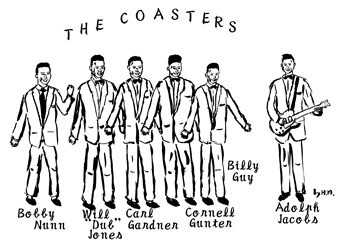

Rhythm & Blues, born in around 1950, seemed to have developed by the mutual influence of guitar music of folk or blues, big band jazz and doo-wap, derived from the gospel chorus of the church. Especially, it is easy for you to doo-wap without any instrument if three or four persons get together, so it used to be that young dreamers raised their voices at any downtown street conrer and formed groups named "----s" one after another and sometimes had instant successes and disappeared like bubbles. '50s doo-waps are roughly classified into sweet ballads, where a tenor plays the main part, and novelties with comical exchanges of words between a tenor or a baritone and a bass. The Coasters of the Atlantic years were typical of the latter.
I first heard some of their tunes at once on "Atlantic Rhythm & Blues 1947-1974" which I borrowed from a library, and then I found the bass man, who sings the punch line part out of the funny lyrics, the center of Coasters. Bobby Nunn took charge of it until 1958. He joined the group Robins in Los Angeles and had songs under the production of Johnny Otis at Savoy label including a duet with Little Esther (the future Esther Phillips) Double Crossing Blues (this appears on "Johnny Otis presents The Robins"). After Robins walked from label to label, they had a hit Smokey Joe's Cafe at Jerry Leiber and Mike Stoller's Spark label. When Spark was absorbed into Atlantic, Bobby Nunn and Robins' lead tenor Carl Gardner decided to form the Coasters and had hits like Down in Mexico, Searchin', and Young Blood under the Leiber-Stoller team. But Bobby Nunn didn't follow Leiber-Stoller when they moved their operation to New York where Atlantic based (I had written above from the biography on All Music.com. Most liner notes of CDs says that the Coasters had their position in New York at the time when they moved to Atlantic, however, tunes featuring Bobby Nunn were recorded in Los Angeles. So I agreed with the former ) . That's why Will "Dub" Jones joined as bass in '58. Afterward the Coasters, lead tenor Carl, bass Will, baritone Billy Guy and second tenor Cornell Gunter (sometimes guitarist Adolph Jacobs is counted as a member), began their golden era with great performances featuring that cool saxophonist King Curtis.
Compared with Bobby Nunn, still an orthodox singing bass, Will "Dub"Jones was a rapping bass. Before joining The Coasters he gently sang authentic ballads like Why Don't You Write Me? in the group Jacks, however, he greatly rapped Stranded in the Jungle in the alias of Jacks, Cadets. This is a tremendous tune composed of the alternatation of the joyfully melodious part in the States and the part of loud-beat rhythms and barbarious chorus and Tarzan-like battle cry in the jungle, which gave me a conspicuous impression of his presence when I first heard it on a CD of a library, even if I couldn't recognize Jones (You can hear the two songs on the compilations "Golden Age of American Rock'N'Roll " Volume 1&4).
In the Coasters he emphasized himself on such comical roles. As you can hear on the bests "The Ultimate Coasters" or "The Very Best of The Coasters" or a UK compilation "Yakety Yak" and so on, there is a succession of funny tunes containing killer lines of Yakety Yak or Charlie Brown ("Don't talk back" or "Why's everybody always pickin' on me?") and inflaming lines about a heroine's crisis on a TV program in Along Came Jones. Meanwhile, Jones delivers a low and confortable voice in Three Cool Cats, and in Shoppin' for Clothes he builds a cool and amuzing charm of his bass accompanied with sexy horns, percussions and a sax. In the States little of those who were teenagers of the time may know the name Will "Dub" Jones, however, many of them may find him out when they hear the songs. Though it might be that the lyrics used to be written about young days of funny 'slices of life', today is the age of guns and drugs in a school life and there lies a piece of paper between absurdity and severity; still Coasters' songs have high qualities of composition, chorus and performance, in which they exquisitely mix funniness and seriousness. Even in the present, when the two things are likely to be seperated to the extreme because of their close relation, you may have a new discovery if you listen to the tunes. (2004/11/12)(2006/04/05)